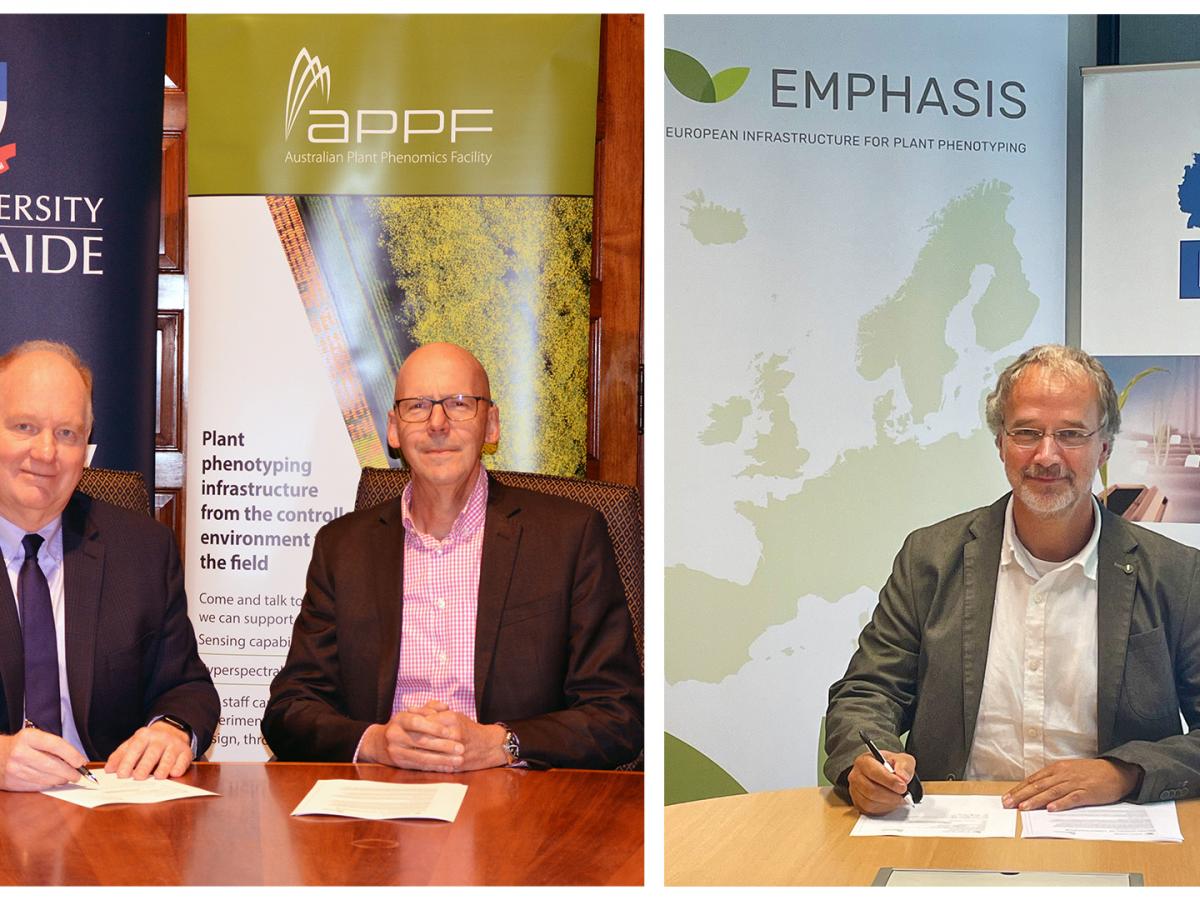The global challenges of crop productivity and food security gained a global research platform today, with the signing of an MOU between the University of Adelaide and Forschungszentrum Jülich in Germany.

University of Adelaide's Deputy Vice-Chanceller (Research), Anton Middelberg; Australian Plant Phenomics Facility Executive Director, Richard Dickmann; and EMPHASIS Coordinator, Professor Ulrich Schurr, signing the memorandum of understanding.
The memorandum of understanding formalises a commitment to cooperation in enabling crop improvement via advancements in plant phenotyping made by international researchers at the University of Adelaide's Australian Plant Phenomics Facility (APPF) and the European Infrastructure for Plant Phenotyping (EMPHASIS) coordinated at Forschungszentrum Jülich in Germany
Plant phenotyping is a growing field of plant science that specialises in capturing data via point sensors, imaging systems and remote sensing platforms, then utilising data management and analysis to more efficiently validate new traits and environmental dynamics.
The APPF and EMPHASIS are both world-leading infrastructure facilities enabling researchers to quantify and understand plant structure and function, which in turn helps accelerate the development of more resilient and higher yielding crops. Closer collaboration between the two organisations will lead to greater research efficiencies based on 'standard' profiles for experiment documentation and data, shared technical innovations, greater project cooperation and avoiding research duplication.
APPF is supported by the Australian Government's National Collaborative Research Infrastructure Strategy (NCRIS) and hosted by the University of Adelaide.
University of Adelaide Deputy Vice Chancellor and Vice President (Research) Professor Anton Middelberg sees great value in the partnership.
"Sharing knowledge is fundamental to progressing innovation in plant phenomics and this MOU has been drafted by both parties to establish the framework within which our cooperation can be developed," he says.
"We are looking forward to working together via virtual events, workshops and seminars.
"The agreement also establishes joint principles for collaboration and agreed sets of standards that will benefit the plant science and plant phenotyping communities in Europe and Australia. It will broaden the scope of our research and create joint opportunities for education and outreach, project funding, and sharing phenotyping information that advances plant science at the University."
APPF Chief Executive Officer Richard Dickmann says the APPF is excited about working with its European equivalent.
"The agreement recognises the world-class capabilities of the APPF and will have benefits for Australian farmers, regional communities and people choosing a career linked to agricultural research. We are now establishing a working committee to implement our pathway forwards," he says.
EMPHASIS coordinator Professor Ulrich Schurr, from the Research Centre Jülich, says Australia and Europe have worked hand-in-hand to pioneer modern plant phenotyping over the last decade.
"We are excited to further extend this very successful cooperation and strengthen the connection between plant phenotyping researchers from APPF with the European plant phenotyping community organised by EMPHASIS," he says.
Dr Inmaculada Figueroa, Vice Chair of the European Strategy Forum on Research Infrastructures (ESFRI) is also positive about the new Memorandum of Understanding.
"International cooperation in science and technology linking research infrastructures is an important part of addressing major global challenges such climate change, sustainable agriculture and food security," she says.
"The cooperation between APPF and EMPHASIS represents an important step to jointly and synergistically address these global challenges."
About APPF and EMPHASIS
The Australian Plant Phenomics Facility, funded under NCRIS, is a distributed network of national research infrastructure platforms offering open access to plant phenomics technologies, tools and expertise. Current partners are The University of Adelaide and the Australian National University.
The European Infrastructure for Multi-scale Plant Phenomics and Simulation (EMPHASIS) is a distributed Research Infrastructure project of ESFRI Roadmap with the goal to develop and provide access to state-of-the-art phenotyping facilities and services addressing multi-scale phenotyping in different agro-climatic scenarios across Europe.






